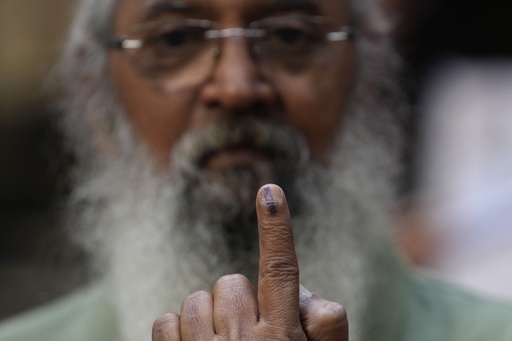
NEW DELHI — On Wednesday, millions of Indian citizens cast their votes in crucial state elections in Maharashtra, a key industrial area in the western part of the country, and in the resource-abundant eastern state of Jharkhand. These elections serve as a barometer for the popularity of Prime Minister Narendra Modi’s Hindu nationalist Bharatiya Janata Party (BJP) alongside its regional allies.
Maharashtra stands as India’s wealthiest state and is also the home of its financial and entertainment epicenter, Mumbai. Currently, a coalition led by Modi’s BJP along with a Hindu nationalist ally governs the state. In contrast, Jharkhand is led by an opposition alliance that includes the Congress party.
Modi has been active in both states, holding large rallies aimed at galvanizing voter support. This electoral challenge occurs just months after his party faced difficulties, regaining national power for a third consecutive term without having a parliamentary majority, requiring collaborations with regional groups to form a government.
Ahead of the elections, Modi appealed to the citizenry through a post on the social media platform X, encouraging young people and women to turn out in significant numbers on voting day.
Political analyst Nilanjan Mukhopadhyay, who has authored a biography on Modi, remarked that a loss in these elections could negatively affect Modi’s reputation and governance style. “Such a setback would resonate in future elections in states like Delhi and Bihar next year,” he noted.
Votes cast in both Maharashtra and Jharkhand are scheduled to be counted on Saturday. Following the national electoral setback, the BJP gained some traction in October by winning local elections in Haryana, where analysts had anticipated a simpler victory for Congress.
In a notable comeback, Rahul Gandhi’s Congress party celebrated a win in local elections in Jammu and Kashmir, an area long affected by insurgency, after a decade-long hiatus.
The BJP is actively aiming to unseat the Congress party and its coalition in Jharkhand, a state abundant in minerals like iron ore and coal.
To rally Hindu voters, the BJP has deployed slogans such as “If you divide, then you will die” and “If we are united, then we are safe.” This tactic has fueled allegations from opposition parties that the BJP seeks to polarize the electorate along religious lines, with Hindus making up approximately 80% and Muslims accounting for about 11.5% of Maharashtra’s 131 million residents.
Mukhopadhyay believes there is a noticeable trend among top BJP officials leaning toward communalizing the electoral process. He commented, “This reflects a growing sense of desperation within the party, as they seem to perceive themselves underperforming in both Maharashtra and Jharkhand.”
Polling predictions leading up to the elections indicated that the opposition alliance, which consists of Congress and two smaller parties, Shiv Sena and the Nationalist Congress Party, holds an advantage over the BJP-led coalition in those states. In the June national elections, Congress secured 30 out of 48 parliamentary seats in Maharashtra, while the BJP and its allies managed only 17 seats.
The Congress coalition hopes to leverage public dissatisfaction, particularly around issues like soaring youth unemployment, rising inflation, and plummeting crop prices attributed to the BJP administration.
To win over women voters, the BJP introduced a program promising 1,500 rupees (approximately $18) per month to over 20 million women aged 21-65 with an annual family income of less than 250,000 rupees (around $3,010). Conversely, should the Congress party regain power, they have pledged to double this amount and offer free transportation on government buses.
